|
Music Is The Healing Force Of The Universe The Inconsistency of |
|
|
||||||||||||||||
|
News from 2006 January 1 2006 News Albert Ayler nominated for 2 Grammys Revenant’s Holy Ghost box set has received two Grammy 2005 nominations in the following categories: ‘Best Boxed Or Special Limited Edition Package’ and ‘Best Historical Album’. Although it seems a long while now since Holy Ghost was released, it just missed the closing date for last year’s awards and falls into this year’s eligibility period (October 1st 2004 to September 30th 2005). The full list of nominations is available on the Grammy site (much joy in the Mariah Carey household apparently) but you’ll have to scroll down a bit for Categories 87 and 89: Category 87 Best Boxed Or Special Limited Edition Package · Holy Ghost: Rare & Unissued Recordings (1962-70) · The Legend · Pure Genius: The Complete Atlantic Recordings (1952-1959) · Weird Tales Of The Ramones · You Ain't Talkin' To Me - Charlie Poole And The Roots Of Country Music Category 89 Best Historical Album · The Complete Library Of Congress Recordings By Alan Lomax · Holy Ghost: Rare & Unissued Recordings (1962-70) · The Legend · Pure Genius: The Complete Atlantic Recordings (1952-1959) · You Ain't Talkin' To Me - Charlie Poole And The Roots Of Country Music As you can see, Revenant are facing some stiff competition, and if you’re thinking of putting money on it, I’d go for the “Best...Package” category. The Awards Ceremony will take place on Wednesday February 8th and will be broadcast live from the Staples Center in Los Angeles (in the U.S. at least, not sure whether we get an edited version on some digital channel over here in England). Good luck to Revenant and whatever the outcome, it’s good to see Albert’s name in the list. *** “ESP” Box Set Still no clear sightings of this one, but amazon.co.uk now has a track list. It’s a four CD set, with basic copies of the four original ESP Ayler releases, Spiritual Unity, Bells, New York Eye And Ear Control and Spirits Rejoice. So, no Prophecy or Slugs. Bernard Stollman of ESP has posted this note on the All About Jazz website: “Two box sets of CDs are now being distributed by the Italian company, Abraxas: The Complete Albert Ayler on ESP-DISK and The Complete Sun Ra on ESP-DISK. *** Ayler Sheet Music Following last month’s request for sheet music of Albert Ayler’s compositions, I received an email from Steve Tintweiss containing over thirty examples of Ayler lead sheets. These were originally included as an appendix to Jeff Schwartz’s online biography of Ayler, but were removed for some reason. I will add them all to the site eventually, but Steve suggested I highlight a couple each month and invite visitors to the site to discuss them on the message board. As Steve says, “Albert really deserves more credit as a great composer - as eventually some of his tunes are making their way into the ever evolving historical jazz repertoire. Unique, many hummable, catchy, and always memorable. Like Thelonius Monk, the instrumental tunes in particular become one with the style of playing that these jazz artists pioneered. Instantly recognizable indeed!” So, to kick off the New Year, here’s “Truth Is Marching In” and “Change Has Come”: |
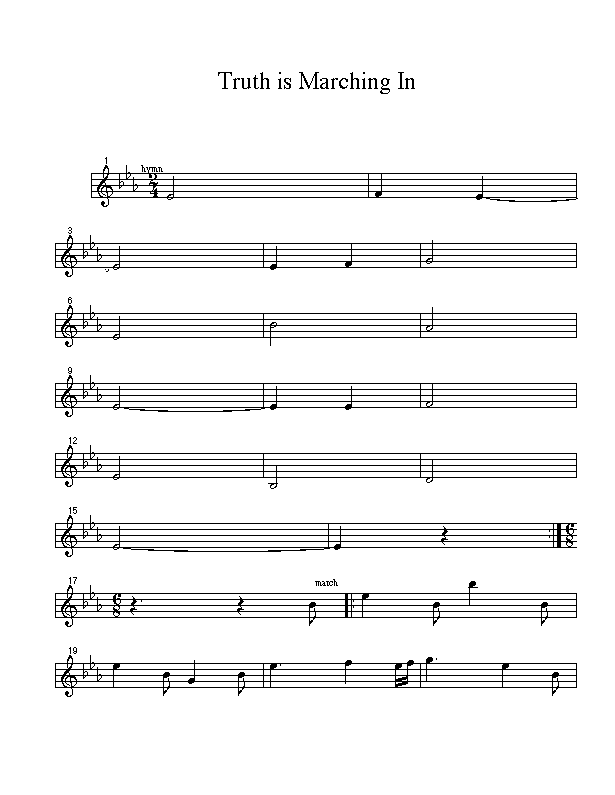 |
||||||||||||||||||||||||||||||
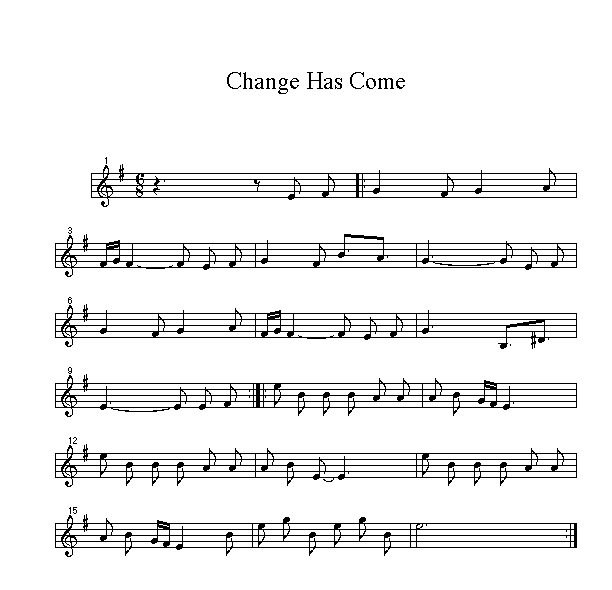 |
||||||||||||||||||||||||||||||
|
New Additions to the Site Last year’s ‘What’s New’ page has been archived and the What’s Available page has been updated for January. *** February 1 2006 News Albert Ayler and the Grammys Only a few days to go now until we find out whether Albert Ayler has finally won a Grammy - the Awards Ceremony takes place on February 8th. Here’s the email which Revenant has been sending out which mentions the other awards which the Holy Ghost box set has already won: |
||||||||||||||||||||||||||||||
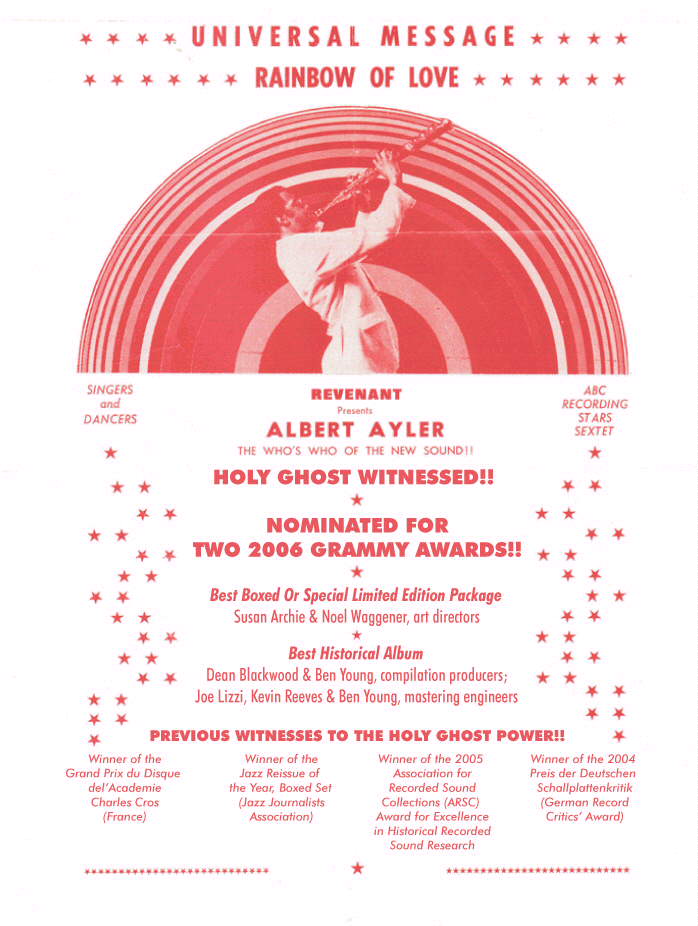 |
||||||||||||||||||||||||||||||
|
*** And if you ever wondered where Revenant acquired that flyer for Ayler’s concert at the Hotel Diplomat in 1968, Lee Santa explains: *** Ayler Sheet Music Here’s another couple of Ayler lead sheets. Don’s ‘Our Prayer’, and ‘Water Music’ from The Last Album: |
||||||||||||||||||||||||||||||
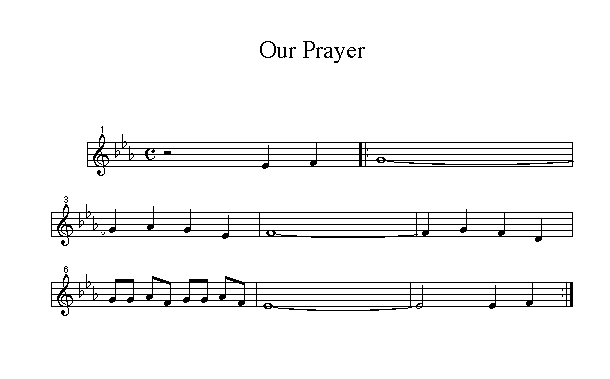 |
||||||||||||||||||||||||||||||
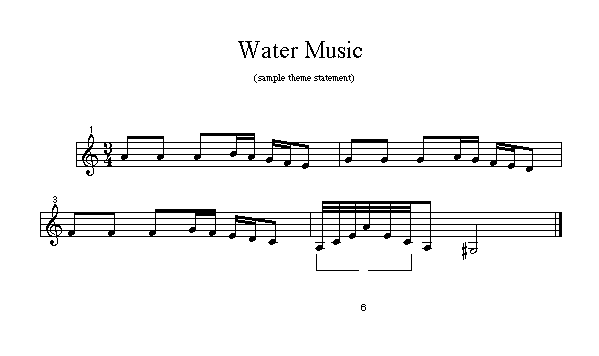 |
||||||||||||||||||||||||||||||
|
*** And finally... Apologies for this, there’s no Ayler content at all, apart from the fact that the email came from Paul Karting, who arranged Ayler’s first visit to the Netherlands in 1964, but sometimes obsessions collide and just have to be acknowledged. Apparently, Eric Dolphy can be seen playing baritone sax behind the Platters in Roger Corman’s 1956 film ‘Rock All Night’ which stars the great Dick Miller (I wrote a song about him once). Anyway, full details of this peculiar collision of worlds can be found on Alan Saul’s Dolphy site including some stills from the film, and Paul would like to hear from anyone who can identify the other members of the band - apparently it’s Eddie “Mush Mouth” Beal on piano. Let me know if you’ve got any ideas and I’ll pass them along to Paul. I couldn’t help, of course, but if he’d asked me in which Corman film Dick Miller played both a cowboy and an Indian, no problem. Anyway, here’s a picture of Eric Dolphy in ‘Rock All Night’: |
||||||||||||||||||||||||||||||
 |
||||||||||||||||||||||||||||||
|
*** New Additions to the Site What’s Available page updated for February. *** February 9 2006 News We Woz Robbed Sad to say Albert Ayler is still Grammyless. Revenant’s Holy Ghost box set missed out in the two categories it was nominated for. The ‘Best Historical Album’ award went, rather inevitably, to the ‘Complete Library Of Congress Recordings of Jelly Roll Morton’, and the ‘Best Boxed Or Special Limited Edition Package’ to the Johnny Cash set, ‘The Legend’. I did think that Revenant stood a good chance in the latter category, for sheer grandiosity alone (the Holy Ghost package is a strange and wonderful artefact), but I guess Johnny Cash is on a roll right now with the biopic chasing the Oscars. Still, many congratulations to Revenant for at least getting Albert nominated. The full results are available on the Grammy website. *** March 1 2006 News ‘My Name Is Albert Ayler’ in UK and Canada The Wire is promoting two showings of Kasper Collin’s documentary, “My Name Is Albert Ayler”, in the U.K. in April - at London’s ICA, on April 18th (6.30 pm) and at Glasgow’s Centre for Contemporary Arts, on Saturday, April 22nd as part of the Subcurrent 2006 Festival, organised by Volcanic Tongue. The film is also due to be shown at the Big Smash! Music-On-Film Festival in Vancouver, Canada (20 - 25 April). *** Norman Howard CD to be released on ESP - finally Last September I included an email from Roy Morris concerning the strange history of the master tapes of Norman Howard’s 1968 recording session which were originally intended to be released as ESP 1073. Now, according to Roy, and the All About Jazz interview with Bernard Stollman (which is also available on the ESP site) the music is finally going to be released by ESP. This is what Mr. Stollman had to say about it: “AAJ: Is there anything else in the unissued vault? As I wrote in a follow-up piece last October, I do believe the release of this session will shed more light on Ayler’s recording of Witches & Devils (aka Spirits). *** And talking of Spirits..... and the lack of alternate takes in the ESP vault. The following is definitely one for the collectors. I’d never heard of it until George Scala sent me the details and the photo below - a 1996 Japanese release of a gold CD version of Spiritual Unity on the Venus Records label (TKCZ- 36010), which contains both versions of ‘Spirits’ - the long one which was only issued on the earliest pressings of the LP, and the shorter version which replaced it on all subsequent releases. I’ve placed the cover photos on the Spiritual Unity page, but here’s the CD itself in all its golden splendour: |
||||||||||||||||||||||||||||||
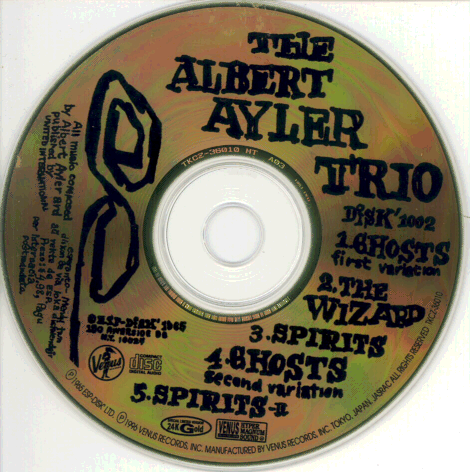 |
||||||||||||||||||||||||||||||
|
And finally, Thanks to Tim Witham for letting me know about an Ayler article on the BigO Magazine website, especially since it includes this photo of Albert and Mary Maria playing golf: |
||||||||||||||||||||||||||||||
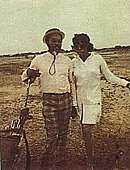 |
||||||||||||||||||||||||||||||
|
New Additions to the Site Ayler Sheet Music: I’ve added all the Ayler lead sheets, courtesy of Steve Tintweiss and the Jeff Schwartz site, to this site. You’ll find them listed on the Ayler Sheet Music page. Bibliography: I’ve also added some items to the Ayler Bibliography page, including a list of magazine articles and a filmography. What’s Available page updated for March. *** April 1 2006 News ‘My Name Is Albert Ayler’ in UK and Asia Full details of the British premiere of Kasper Collin’s film on April 18th are now available on the ICA’s website. And the Asian premiere of ‘My Name Is Albert Ayler’ is scheduled for the same date at the 19th Singapore International Film Festival. *** New Additions to the Site Ayler Remembered Jorge Thompson of Florida kindly sent me a reminiscence of Albert from his army days in France. I’ve added it to the Ayler Remembered page, but I thought I’d also include it here: “I saw Ayler frequently at the Harbord Barracks EM (enlisted men) club in Orleans, France during the period 1961-1962. He would give these free noon concerts that were frequented by civilians who perhaps lived in Orleans and the surrounding areas. US soldiers that frequently attended were mostly from the large cities of New York, Los Angeles, Chicago. I would think that it was the Europeans who understood the music better than the GIs. This is something great you guys are doing to remember a very unique sax player. I remember Ayler always had on a black sort of leather jacket (not the type worn by motorcyclists) men wore in France during that time. Ayler was not playing hard bop or mainstream music. He was sort of initiating what he later ended up being known for - Avant- Garde. I was very familiar with bop because I was listening to the original Jazz Messengers and Diz and Bird. He was seen as a very pleasant person doing, on his own, public service work for the US by playing his music for free at the EM club while representing the United States as a soldier.” *** Original ‘Ghosts’ on ebay This auction is due to end in a couple of days, and so far, with a starting price of $499.99, it has failed to attract any bids, but it did give me chance to nick the photos of the cover of the original Danish Debut version of Ghosts. I’ve added some of the other shots to the site, but here’s the cover: |
||||||||||||||||||||||||||||||
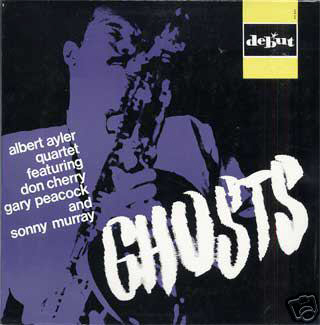 |
||||||||||||||||||||||||||||||
|
An apology Since January I’ve been adding Ayler lead sheets to this page and last month I added them all to the site on the Ayler Sheet Music page. I’ve always credited them as coming from the Jeff Schwartz site via Steve Tintweiss, however, what I didn’t know is that Jeff Schwartz did most of the transcriptions himself. So, I just thought I should give him the credit for that - he’s a better man than I am, Gunga Din. *** What’s Available page updated for April. *** May 1 2006 News ‘My Name Is Albert Ayler’ in London Unfortunately I couldn't make it to the English premiere of Kasper Collin's film, "My Name Is Albert Ayler" at the ICA in London on April 18th (money wasn't "strong enough"), but Richard Leigh emailed me to say that the event was an enormous success and the film was well-received by a full and enthusiastic house. There was a Q & A session after the show during which Kasper Collin did say that the film would be released on DVD but gave no further details. The event was previewed in The Guardian and there’s now a review of the film on the All About Jazz site. I also found this review of the film (in English) by Norwegian blogger, Christopher Monsen. *** New Ayler Impulse Compilation Verve are celebrating the 45th anniversary of Impulse Records with the release of a number of compilation CDs this June, one of which is devoted to Albert Ayler. The compilations will have the generic title The Impulse Story and as well as Ayler will feature the following musicians: Gato Barbieri, Alice Coltrane, John Coltrane, Keith Jarrett, Charles Mingus, Sonny Rollins, Pharoah Sanders, Archie Shepp and McCoy Tyner. There will also be a four CD box set, The House That Trane Built: The Story of Impulse Records, which is also the title of a book by Ashley Kahn which will be published at the same time. For more information, there’s an article by Chris Morris available on Yahoo! Canada News and Billboard. The Ayler CD is listed on internet stores but there are no track details as yet. It will be very interesting to see what Verve choose to reflect Ayler’s contribution to the Impulse story. *** And finally.... a question of etiquette Googling for Ayler items I came across a curious thing. Albert now has a page on myspace.com. I've heard of myspace but I've never visited it before so it's a bit disconcerting to see things like "Albert Ayler's Latest Blog Entry" (a bit like the Ayler page on the Verve site where you're invited to let them know about Albert's latest tour information - the Elysian Fields perhaps). Anyway, as we all know, the internet is a strange and wondrous place and I wouldn't be mentioning this at all if it wasn't for the fact that whoever made Albert's page on myspace lifted the biography from this site - verbatim, since it includes my aside about the Trooping of the Colour. Now, I don't mind this at all - except I wish they'd edit that bit out (it seemed funny when I wrote it six years ago, but seems incongruous on other people's sites) - but I also reveal my feelings about New Grass which then get attacked in various posts on the myspace page. Now, what is the etiquette here? I'm not responsible for the myspace page, but I did write the brief biography of Ayler which people are objecting to. Where is Lou Costello when we need him? *** New Additions to the Site What’s Available page updated for May. *** June 1 2006 News New Ayler Impulse Compilation The new compilation CD of Ayler tracks from the Impulse catalog, Albert Ayler: The Impulse Story is due to be released on the 6th June. The track list is as follows: 1. Holy Ghost (from Live In Greenwich Village: The Complete Impulse Recordings) So that’s an even split - five from the good stuff and five from the, let’s just call it the other stuff. What is interesting is that there are two tracks from The Last Album, which only had a limited CD release and that was a while back, certainly before this site went online. Whether Verve are trying to get Ayler fans who may not have The Last Album, to buy the compilation for those two tracks alone, or whether it’s an indication that The Last Album is going to be released at some point, I don’t know. ‘Untitled Duet’ is Ayler on bagpipe chanter and Henry Vestine on electric guitar and is not one of my favourites (and speaking of favourites, how come ‘Change Has Come’ isn’t on there). On the other hand, ‘Water Music’ is a great track and there’s a scratchy version of it on The Last Album page of the discography. Verve are also releasing The House That Trane Built - The Best of Impulse Records, which includes ‘Our Prayer’ from Live In Greenwich Village: The Complete Impulse Recordings. This, of course, is a Don Ayler tune, and although they’re not legally obliged to do so (since Don signed the rights away), it would be nice if Verve could do the decent thing and send him the royalties. Full details of the two albums are accessible from the Albert Ayler page of the Verve website and the notes by Ashley Kahn on the Albert Ayler: The Impulse Story page make for interesting reading. The penultimate paragraph offers this summing up of Ayler’s Impulse period: “It’s clear Ayler found the freedom and support he was looking for at Impulse. He had completed a five-year period of rapid growth by the time he joined the label in ’67. His In Greenwich Village album serves as a farewell look back to his edgier, more avant-garde recordings. For Ayler, the four discs that followed constituted a creative rebirth, with shorter song forms and lyrics — most supplied by his girlfriend, vocalist Mary Parks (known professionally as Mary Maria) — and reached for a new and more youthful audience.” That’s one view, of course. The other might wonder what effect the cancellation of his Impulse contract on his return from France in August 1970 had on Albert’s mental state at the time. |
||||||||||||||||||||||||||||||
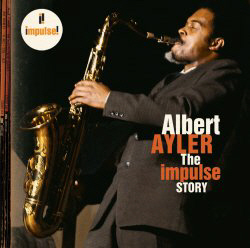 |
||||||||||||||||||||||||||||||
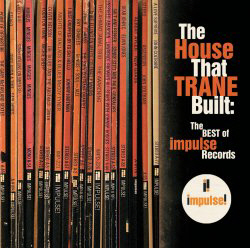 |
||||||||||||||||||||||||||||||
|
Baden-Baden Free Jazz Meeting I’m grateful to Pierre Crepon for sending me the following track - it’s a tribute to Albert Ayler, recorded at the Baden- Baden Free Jazz Meeting on the 7th December 1970, just twelve days after Albert’s body was found floating in the East River. The band features Don Cherry, Steve Lacy and some of the leading musicians of the European free jazz scene, including: Tomasz Stanko, Manfred Schoof, Albert Mangelsdorff, Paul Rutherford, John Tchicai, Trevor Watts, Peter Brotzmann, Willem Breuker, Gunter Hampel, Joachim Kuhn, John Dyani, Peter Warren, Dave Holland, Han Bennink, John Stevens, Pierre Favre, Norma Winstone and Karin Krog. Let’s Sing For Him (March In Memory of Albert Ayler) *** ‘My Name Is Albert Ayler’ Interplay ! Berlin - Free Jazz & Improvisation in Film are showing both Michael Snow’s New York Eye and Ear Control and Kasper Collin’s My Name Is Albert Ayler on Sunday 4th June. Full details on the website. There are also reviews of Kasper Collin’s film on Film Exposed and The Lamp and a couple of posts on the Mountain 7 site. *** New Additions to the Site What’s Available page updated for June. *** July 1 2006 News The Impulse Story Not much to report this month - it must be the World Cup - but there are a couple of items relating to the Impulse compilations released last month. There’s an interview with Ashley Kahn and extracts from his book The House That Trane Built on the National Public Radio site. Although I tend to fixate on this site about the uncomfortable relationship between Ayler and Impulse, it should be remembered how important Impulse was to the free jazz movement and how much great music was packaged in those wonderful gatefold sleeves - for example, the NPR page has a link to Sonny Rollins’ ‘Alfie’s Theme’ - enough said. There’s a review of the Ayler compilation by Thom Jurek on the All Music site. *** New Additions to the Site What’s Available page updated for July. *** July 11 2006 News Ayler at 70 Thanks to Ronald Wilson for reminding me that Albert Ayler would have been 70 on Thursday. WNUR 89.3 FM in Chicago is broadcasting an Albert Ayler 70th Birthday Marathon on Thursday, July 13th, 2006, from 5 am to 9 pm CDT (GMT -0500), which should be available through their website. *** Albert Ayler Project The UK’s premier Ayler tribute band, the Albert Ayler Project, are playing the Ashton Court Festival (just outside Bristol) on Sunday, 23rd July at 8.15 pm, on the Blackout Stage. Phil Newberry alerted me to this event, but I also received an email from Roger Skerman of the band, who added the following appeal: *** July 15 2006 News Along An Eastern Shore Very short notice for this one, but thanks to Bill Schmidt for letting me know about it. Tomorrow, Sunday July 16th (12.30-2.30 pm), there’s the world premiere of R. A. Washington’s ‘Along An Eastern Shore’, at the 2006 Ingenuity Festival in Cleveland. The following information is taken from the Ingenuity Festival website: ‘“Along An Eastern Shore" is a choreopoem set to music celebrating one of the free jazz most intriguing players, Albert Ayler. Come witness r.a.washington direct a twelve piece band featuring poet Daniel Gray-Kontar as THE AYLER VOICE. Washington is a writer, musician (Vernacular/MuAmin Collective/BlkTyger), a teacher and member of The Progressive Arts Alliance. Washington is the author of three books of poetry: “for me, with those before in mind” (1995), “i wish poppa dop wuz here” (1997), and “riot sketches” (1999). Washington has published two novellas: “a boy named james” (1999) “and open” (2000), and memoir of adolescence: “RE: Unions” (2003). His short films and paintings have been shown in independent galleries across the east coast, as well as, London, England, and Toronto, Canada. Washington served as the Cleveland Museum of Art’s first ever Poet-in-Residence. As the museum’s poet, Washington wrote curricula for creative writing classes, and visited several schools, and recreational centers bringing the message of literature as a tool in building a critical life. Washington has work forthcoming in “Quotes Community: Notes for Black Poets”, edited by Thomas Sayers Ellis.’ *** August 1 2006 News Along An Eastern Shore R. A. Washington’s ‘choreopoem’ in tribute to Albert Ayler, “Along An Eastern Shore”, performed by Daniel Gray-Kontar and the Albert Ayler Awareness Orchestra, had its world premiere at Cleveland’s Ingenuity Festival on July 16th. Photos of the event by Lou Muenz are available on his website, and there’s a six minute video extract on the YouTube site. By the way, there’s another Ayler item on YouTube, featuring The Click Five (a popular beat combo) - very bizarre. *** My Name Is Albert Ayler - Minneapolis The Kasper Collin film is included in the 7th annual Sound Unseen film and music festival in Minneapolis and will be shown at the Riverview Theater on Saturday, August 19th at 1 pm. *** Albert Ayler, Cecil Taylor and the Danish Hamburger In Marc Chaloin’s essay, ‘Albert Ayler in Europe: 1959-62’ (included in the Holy Ghost book and available on the Revenant website), he recounts the strange tale of an aborted recording session featuring Albert Ayler and Cecil Taylor. I came across the origin of the story the other day on Torben Ulrich’s website. The following is an extract from an interview with Ulrich by Lars Movin, from Jazz Special (International Edition, 2003): “ -However, the most interesting story is about Albert Ayler and Cecil Taylor, who were supposed to play together, but that never happened. One of the most fantastic periods in the history of Jazzhouse Montmartre was when Cecil Taylor and Albert Ayler both were in town [November 1962]. In the evening, Cecil Taylor played with Sunny Murray and Jimmy Lyons, and Albert Ayler played with pianist Atli Bjørns' group for a late night show. Those were amazing times, but also very straining for the employees as well as business. Let's say that Dexter Gordon played a tune that lasted eight minutes or a quarter of an hour and then it stopped. Then the waiters could serve the tables. Cecil Taylor on the other hand, he played for around fifty minutes non stop. And on top of that, the clientele he attracted weren't really interested in drinking beer or anything else, so there wasn't much business for the waiters. -And then late at night, Albert Ayler would come along and roar with his saxophone, and that wouldn't make things much better. I especially remember one night, when Albert Ayler played well into morning. They just went on and on, and at one point, one of the waiters just couldn't take any more. Suddenly he put down his tray in front of the stage, stepped up and socked Albert Ayler and yelled, ... Shut up! ... Shut up! And Ayler was playing, only the white of his eyes showing, and he had no idea what was going on. The room went silent. And afterwards the waiter was miserable, and he hugged Albert Ayler and they cried, and it was terrible. But it goes to show what kind of pressure everyone was under, maybe the musicians too. There was a lot going on. -It went on that way for a few days with us all hanging out till morning. Albert Ayler and Sunny Murray, who played drums with Cecil Taylor, were good friends, I think they'd already played once in New York at what could be called a historic meeting. But they hadn't recorded together. And so Erik Wiedemann and I decided to make a show with the two of them playing together. As I mentioned, we made these radio shows once a week or maybe every other week, and occasionally we had a chance to invite musicians to play in the studio, either Danes with international guests or local talent. So we asked the director of the entertainment dept. if we could do something with Albert Ayler and Cecil Taylor. He mumbled a little and then he asked what it would cost. Well, it wasn't free. Cecil Taylor wanted 15.000 kroner and Albert Ayler and Sunny Murray had to be paid too. No way, and who did this jazz musician think he was anyway! Of course, if it had been Duke Ellington or Count Basie, things would have been different. But who the hell was Cecil Taylor, not to mention Albert Ayler? Eventually they let us do it anyway. It was the most expensive project we ever did. -The day of the recording came, and let's say the studio was booked for one P.M.. That meant that Sunny Murray would bring his drums from Montmartre and Cecil Taylor and Albert Ayler would arrive directly from the hotel. Naturally Erik and I were ready at one o' clock, drumming impatiently on the table, and it turned 1:15 and 1:30 and not a damn thing happened. So we called the hotel and found out that they thought we were going to pick them up. Okay, we drove over to pick them up. When we got there, Sunny Murray was there without his drums. He hadn't been over to Montmartre yet. Okay! We agreed that he would take a cab over to Montmartre and get his drums. In the meantime, the technicians were waiting. Now we had Albert Ayler and Cecil Taylor in the building, but since Sunny Murray was picking up his drums, they figured they'd get something to eat in the canteen. But when they got up there, there wasn't really anything they wanted, so they asked if there was some other place close by. In the meantime, Sunny Murray had arrived from Montmartre saying it was closed, and he couldn't find anybody with a key. So we called the owner, Herluf Kamp-Larsen, to see if someone could let Sunny Murray in to get his drums. By now it was probably two or three o'clock. And Albert Ayler and Cecil Taylor had gone across the street to a little restaurant where they could get some real food. They had ordered a couple of hamburgers from the menu, while Sunny Murray was still trying to get his drums and the time was 3:30 or 4:00. They later told us that it took the longest time to make those hamburgers, and finally the waiter came in with a big silver platter with what turned out to be pork with potatoes and vegetables [in Danish: hamburgerryg], which they didn't intend to pay for. Cecil Taylor got real mad and said they should call the police. The police arrived, and they called the radio studio saying that the police were there and this problem had to be solved. In the meantime it was 5:00 and we had the studio till 6:00. At 5:20, Sunny Murray arrived with his drums, and began setting them up. Naturally, there wasn't much time left to play, because at 6:00 everyone had to leave and there was no chance of working overtime. So we had to cancel the whole thing and send the musicians home. -Afterwards the directors were furious. That was no way to treat the State Radio. But we hadn't lost hope, we asked if we could try again the next week, because the musicians were still in town and we'd love to arrange this historical meeting. But under no circumstances would the radio pay once more, and certainly not Cecil Taylor. But since it wasn't Albert Ayler who called the police, they would accept a session with him and Danish musicians. This resulted in the record MY NAME IS ALBERT AYLER [recorded in January 1963], on which he performs Summertime and several other tunes along with Niels Brønsted and Niels-Henning Ørsted Pedersen, which is fine, but in retrospect it really would have been a historical date if we had succeeded in getting Albert Ayler and Cecil Taylor to record together. But at least we tried.” *** And finally ... another Ayler poem The google expedition which turned up the Torben Ulrich interview also uncovered a poem about Albert Ayler by Ralph Dumain. This comes with a warning though. If you stray from the link to the poem and decide to take a quick glance at the rest of his site (The Autodidact Project), be prepared to spend some time there - lots of fascinating stuff. *** New Additions to the Site What’s Available page updated for August. *** News Henry Kaiser, Albert Ayler....and Mary Maria According to The Flying Luttenbachers' website Healing Force - The Songs of Albert Ayler (with Henry Kaiser, Mike Keneally, Joe Morris, Vinny Golia, Aurora Josephson, Damon Smith and Weasel Walter) will be released later this year. Aurora Josephson’s site amends the title thus: ‘The Songs of Albert Ayler.....and Mary Maria’. which is only right and proper. An interview with Mike Keneally by Beppe Colli (from May 26th this year) on the Clouds and Clocks website provides the following information about the project, which I hope they don’t mind me repeating here: “Last Kaiser experience: You are currently involved in a project about the music of Albert Ayler. Is it too early in the day to say something about it - how it all came together, etc.? It started with me buying the recent box of the complete ESP-Disk' recordings - an Italian release as it happens - and realizing that some of Ayler's lines reminded me a lot of some of Buckethead's phrasing. I didn't have Bucket's number so I called Henry to ask if he knew if Buck had ever listened to Ayler. He didn't think so. I suggested that the three of us should record some Ayler tunes but neither of us had a current contact number for Buckethead, so I said well, maybe you and I should do it. That was the last I thought of it for a few days, until a few days later when Henry called back saying he'd assembled a group of musicians for the project already and also had ideas about songs to play. He wanted to play a lot of vocal songs from later Ayler records - "the ones nobody likes" he said. At that point I realized that Henry had completely picked up this ball and was running with it so I placed the direction of the project in his hands. The original saxophonist Henry had chosen decided to drop out of the project because he felt that the material we'd chosen was making fun of Christianity and Ayler's devotion to Jesus, but in my and Henry's view this is not the case at all - the end results bear no earmarks of easy sarcasm or criticism, to me. Vinny Golia came in to play sax which was an incredible blessing for the project. The players involved were Henry, myself, Joe Morris on guitar and acoustic bass, Damon Smith on acoustic bass, Weasel Walter on drums, Vinny Golia on saxes and Aurora Josephson on vocals. The songs we recorded are New Grass/Message From Albert, Japan/Universal Indians, Music is the Healing Force in the Universe, A Man is Like A Tree, Oh! Love of Life, Thank God For Women, Heart Love, New Generation/New Ghosts. We used a wide variety of approaches in the material, some very reverent and some more playful - for instance New Generation starts out sounding like Beefheart and suddenly shifts into sounding like Sonic Youth. We recorded the basic tracks for the whole album in one day, spent the next day doing overdubs and edits and ended up with 81 minutes of music. Henry was absolutely delighted afterward and said that it's one of the few albums he's done where he really looked forward to listening to it once it was done. It was an explosion of activity which was very focused, and a happy experience for everyone involved I think. I'm very grateful that my casual phone call to Henry about Ayler and Buckethead yielded such tangible results!” *** Guy Villerd This is hardly news since it refers to an Ayler tribute CD released in 2002, but I came across it while googling (which I now hear you’re not supposed to say anymore - Mr Google doesn’t like it since it interferes with his copyright and the correct phrase to use is ‘while searching the internet using the Google search engine © Mr. Google’ - I wonder if Mr Hoover was similarly miffed). Anyway, I digress. The CD, now listed on the Versions and Tributes pages, is One Day... by the Guy Villerd/Ayler Quartet. Usually when I come across an old tribute CD I add it to the site and say no more about it, but Mr Google’s brilliantly original invention also threw up a recent gig of M. Villerd’s band at the Pori Jazz Festival in Finland in July this year - nice to see Ayler’s music return to the land where he made his first recordings. There’s a feature (in French but with pictures) on the band on the Jazz Break site and an interview (in English) with Xavier Garcia, who plays ‘sampler’ with the group, on the Tomajazz site. Further information about Guy Villerd is available on the ARFI (“Association a la Recherche d’un Folklore Imaginaire”) site which includes an extract from his version of ‘Change Has Come’ (click ‘Radio Arfi’). *** Impulse Story Review The All About Jazz site has a review by Chris May of the recently released Ayler Impulse Story CD, Tenor Badness: Albert Ayler, Archie Shepp, Gato Barbieri. *** New Additions to the Site Thanks to ebay, pictures of the original inner sleeve of Bells, printed with the ‘National Observer’ article, The Moody Men Who Play the New Music, added to the Bells page of the discography. What’s Available page updated for September. *** October 1 2006 News London Jazz Festival This year's London Jazz Festival, which takes place at various venues in the City, has three specific Ayler-related events at the South Bank Centre: Spiritual Unity featuring Marc Ribot and special guest Henry Grimes - Friday 10 November, 7:30 pm Queen Elizabeth Hall. “My Name Is Albert Ayler” - Saturday 11 November, 2:00 pm Purcell Room Gathering Ghosts - Saturday 11 November, 4:00 pm The Front Room at the Q. E. H. (admission free) Further details are available on the Royal Festival Hall’s website. *** Joe Rigby How many bells does that name cause to ring? I have to confess I couldn’t place Joe Rigby at all when Roy Morris emailed me to let me know that Joe Phillips was alive and well and still playing, and that his article about Joe Rigby was in the Paris Transatlantic online magazine. To recap, Roy was the guy with the original tapes of the Norman Howard ESP session (still no news from ESP on when ESP 1073 will finally see the light of day). Joe Phillips played alto with Howard on the session. And Joe Rigby? He seems to have knocked around with everybody, including Ayler: “Albert Ayler showed me how to play harmonics in a room at the Theresa hotel in Harlem. I remember Fidel Castro was staying there too.” Unfortunately he doesn’t say whether Fidel joined in the jam. *** Riverboat Lovesongs for the Ghost Whale Regatta is an installation by Michael Jones McKean which was shown at Grand Arts in Kansas City, Missouri from September 1st to October 21st 2006: “Michael McKean's Riverboat Lovesongs for the Ghost Whale Regatta steers a meandering course between the objective facts of navigation and poetic possibilities of exploration. Like many of his installations, it slips between varied levels of reference, in this instance from Twain’s pilot house to Ahab's foredeck to the abandoned shell of Donald Crowhurst's Teignmouth Electron. Stagecraft and artifice are balanced by the concrete presence of clay, wind, and rain, while Albert Ayler's saxophone provides a sporadic and elegiac soundtrack. Casting a shadow over the installation as a whole is the implication that adventure and aspiration may very well end in death by water. Riverboat Lovesongs for the Ghost Whale Regatta will be on show at the DiverseWorks Art Space in Houston, Texas from January 12 to February 24, 2007. *** And finally.... Finding a link between Albert Ayler and Donald Crowhurst (beyond the obvious), you’d think would be enough to satisfy anyone’s transformationalistic gene, but no, one has to go one step beyond and discover the Top Synergy site - “Your key to successful relationships”. I confess, I am completely baffled by this. Is it a spoof? The entries on Adolf Hitler (“Serious and responsible, he tries to carry the world on his shoulders and rarely lets others know that he needs help and support.”) and Saddam Hussein (“Open and generous, Saddam Hussein enjoys a wide circle of friends and acquaintances and he thrives on sociability and fellowship. He is adventurous, playful, freedom-loving, and always ready for a good time.”) would suggest it is, but who in their right minds would go the trouble of inventing such a detailed website. On the other hand, if it is genuine, then we have to face the daunting truth that the world has finally gone mad. *** New Additions to the Site What’s Available page updated for October. *** November 1 2006 News London Jazz Festival Further to the item in last month’s update - here’s a press release about Marc Ribot’s Spiritual Unity concert in London this month: “Marc Ribot’s Spiritual Unity is a group formed by guitarist Marc Ribot dedicated to re-creating and re-imagining the music of saxophonist Albert Ayler, one of the pillars of modern jazz. Ribot has spent years listening to and internalizing the communicative group process integral to Ayler’s music: “a ritual process, through improvisation, of experiencing and presenting the rawest moment of musical creation”. The group features bassist Henry Grimes, who played on many of Ayler's seminal recordings from the 1960s. Grimes’ amazing re- emergence after 30 plus years away from music is now one of the great stories in the annals of jazz. Between the mid-'5O's and the mid-'6O's Henry Grimes played on some 50 albums with the likes of Charles Mingus, Don Cherry, Roy Haynes, Lee Konitz, Sunny Murray, Sonny Rollins, Pharoah Sanders, Archie Shepp, Cecil Taylor alongside his work with Ayler. But after the bass he had played on each and every one of those albums became unplayable in the late 60s, he disappeared from the music scene altogether. Over 30 years later fellow bassist William Parker gave Grimes a new bass and within weeks Grimes began gigging again, his contribution to Ribot’s Spiritual Unity album was his first since his re-emergence on the jazz scene. Trumpeter Roy Campbell and drummer Chad Taylor, best known for his work with the Chicago Underground, complete the group. Campbell’s combination of lyricism and power and Taylor’s muscle and verve invoke the spirit of Ayler’s original band, while Grimes’ bass is straight out of Ayler’s heyday. Ribot’s playing, ranging from delicate beauty to wild wails and shrieks and everything in between, gets astonishingly close to Ayler's vocalised sax sound, matching the spirit and creativity of the saxophonist blow for blow. Box Office 08703 800 400 “ *** My Name Is Albert Ayler - 1 Kasper Collin’s film is also being shown at the London Jazz Festival on Saturday, November 11th, at 2 p.m. in the Purcell Room. To whet your appetite there is a three minute video clip of Kasper Collin talking about the film at this year’s Viennale (Vienna International Film Festival) which took place last month. If you look carefully, around the 20 second mark there’s a brief glimpse of Ayler playing in the background. *** My Name Is Albert Ayler - 2 Ebay currently have a copy of the original release of My Name Is Albert Ayler - Debut 140. The small version of the cover picture has been duly added to the site, but here’s the big one: |
||||||||||||||||||||||||||||||
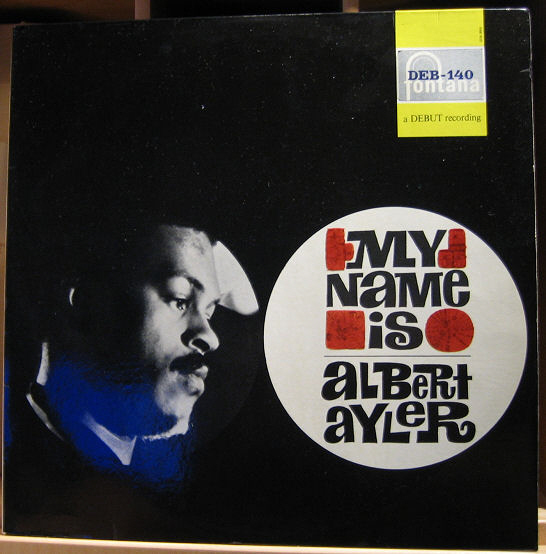 |
||||||||||||||||||||||||||||||
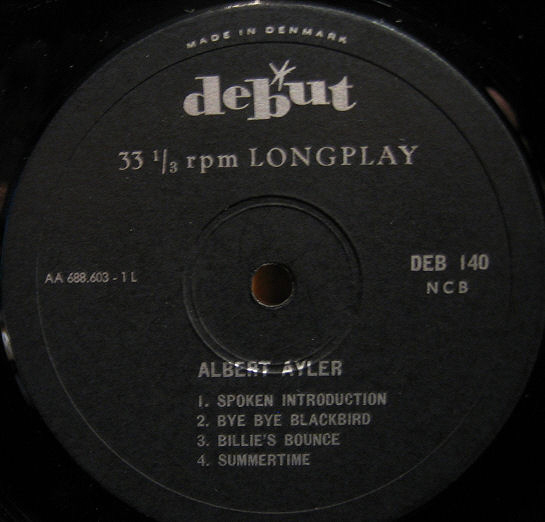 |
||||||||||||||||||||||||||||||
|
And even further back If you haven’t checked out the Ayler Records website recently (which I hadn’t, for shame) you’ll find a lot of interesting stuff on there including videos of Peter Brötzmann, Noah Howard, Sunny Murray and Arthur Doyle, but of specific interest to Ayler fans is an interview with Nils Edström, the photographer who took the picture for the cover of Something Different!!!!! (aka The First Recordings). It makes for fascinating reading, and adda a few more pieces to the puzzle of those early recordings. *** Artists - dontcha just love ’em! Sorry for the vagueness of the following, but you have a go at trying to work it out. It appears that extracts from New York Eye And Ear Control, Michael Snow’s 1964 experimental film for which Ayler and others provided the soundtrack are included in a DVD-rom of the artist’s work. It is called Digital Snow and there is a website you can visit for further information. I wish you luck. Of course, when you’re trying to flog a dvd for a hundred bucks then a little obfuscation is expected. Personally, I think it would have been far more experimental to just put the film on youtube. If the official site defeats you (as it did me) then there’s a review by Marcus Boon from The Wire which makes a little more sense. *** Unlike this. *** What’s Available page updated for November. *** November 2 2006 Blame it on the ghoulies Regarding the link to the video clip of Kasper Collin at the Vienna Film Festival (see below) - this was working when I posted the update, but now seems to have disappeared. Sorry about that. My fault for being too eager and updating the site on Halloween. Rather than remove the link, I’ve left it in place in case the page should ever return. By the way, the ebay auction of the original copy of My Name is Albert Ayler (Debut 140) has ended. It went for $616. *** December 1 2006 News My Name Is Albert Ayler - "Mitt namn är Albert Ayler" Kasper Collin’s film was shown on Swedish TV on November 5th. So far I know of one copy uploaded to the internet, but the site it’s on is not accepting new subscribers, so it’s pointless giving the link here - besides it’s left me in a bit of a moral quandary. Knowing how much work Kasper Collin put into the film, one doesn’t want to cut into his potential DVD profits (should the promised DVD ever appear - no news on the film’s website, although there is a list of forthcoming screenings). On the other hand there are people out there who have been waiting over thirty years to see some film footage (however brief) of Albert Ayler, that the temptation to download the movie is impossible to resist. So, all I can say is ‘Keep watching the skies’ - the film is out there, but if I come across a link which works I won’t be mentioning it on this site, you’ll have to find it yourself. The picture below is from the Swedish TV site: |
||||||||||||||||||||||||||||||
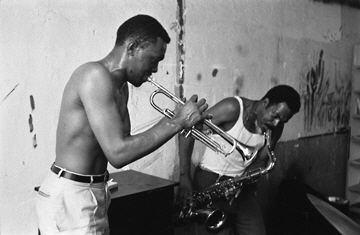 |
||||||||||||||||||||||||||||||
|
Marc Ribot’s Spiritual Unity Three video clips of the performance by Marc Ribot’s Ayler tribute band, ‘Spiritual Unity’ at the London Jazz Festival are available on youtube.com. The Ayler events at this year’s festival also prompted articles in The Sunday Times and Time Out. *** Ghosts the 168th Best Song of the Sixties Thanks to Dana Scott for spotting this one. Back in August the Pitchfork site ran a list of ‘The 200 Greatest Songs of the 1960s’ and Ayler’s Ghosts came in at No. 168. *** |
||||||||||||||||||||||||||||||
 |
||||||||||||||||||||||||||||||
|
HEALING FORCE - The Songs of Albert Ayler (and Mary Maria) Above is a photo of Henry Kaiser waving from Antartica. Back in September I mentioned a recording session with Henry Kaiser and various other musicians, which featured the ‘songs’ of Albert Ayler - i.e. material from the three late Impulse LPs: New Grass, Music Is The Healing Force Of The Universe and The Last Album. At the time I did have my doubts about the project - if you’re going to do an Ayler tribute CD, then obviously you choose the ‘standards’, the good stuff, Ghosts and Bells and Change Has Come - but I kept my opinion to myself and I’m glad I did, since Henry Kaiser then sent me a CDR ot the session, all the way from Antartica. And I have to admit, it was quite a revelation. Ayler fans of a certain generation will always have a problem with the late Impulse LPs. As I've probably said somewhere else on this site, free jazz was as much about freedom as jazz, and when Albert Ayler, the freest of all, started to dilute his music (or so we thought) it left a nasty sound in the ears which has never entirely been muted. Younger fans don't have the problem, they accept New Grass et al on their own terms and good luck to them. The Fondation Maeght concerts, of course, did allay our fears somewhat, but those last three Impulse LPs still bugger up the Ayler discography. And it's not just me. Check out the following from a review of the Kasper Collin film on the Alienated In Vancouver site: “There’s only a very brief treatment of Ayler’s embarrassingly wrong-headed attempts to gain a rock crossover audience, which are made to seem like they were his idea, which one hopes/prays they weren’t; no footage of Mary Parks singing those FUCKIN’ WEIRD songs she did with him (check out “A Man is Like a Tree” sometime -- what universe is SHE from, anyhow?), and no commentary on the apparent bitterness of song titles like “Drudgery,” as attached to a routine blues number on MUSIC IS THE HEALING FORCE OF THE UNIVERSE, and apparently signifying an ironic protest on someone’s part -- probably Ayler’s -- that his music was being used in such a context.” Of course, jazz critics have a similar problem with the start of Ayler’s recording career, but the release of the Holy Ghost box set and Marc Chaloin's superb essay went a long way to explain what the man was up to back then. But the mystery of the Impulse 'rock' LPs remains. Which is why I would say that Henry Kaiser's Healing Force has a significance beyond all the other Ayler tribute projects. By concentrating his attention on the 'bad' Ayler (with the exception of Universal Indians of course, nowt bad about that), he has succeeded in shedding some much needed light onto that dark section of the Ayler discography. I should apologise here for the use of the third person singular - I think it was a collaborative effort of all the musicians involved so for 'his', read 'their'. The line up is as follows: Vinny Golia reeds And the tracks are: 1. MESSAGE FROM ALBERT / NEW GRASS There's a tremendous sense of freedom on the CD, there's no worshipping at the feet of the master, no slavish copying of the original versions. In fact the band reveal their versatility by approaching each track from a variety of different directions - so (according to Henry Kaiser's notes), Heart Love is "The Swans meet Chamber Art Song meet west coast beatnik flute jazz" and New Generation is "Captain Beefheart's Magic Band vs. Sonic Youth". The variety of styles, as well as showing off the talents of the musicians (Vinny Golia is particularly impressive), gives the music an air of spontaneity, a thrill of surprise. But the biggest revelation of all is Aurora Josephson. Admittedly there's not much you can do with Mary Maria's lyrics - they will forever be stuck in the hippy dreamtime - but one of the major problems with the Impulse LPs (for me at any rate) is Mary Maria's vocal talents. Hearing the songs sung by a great singer, does lift them incredibly. Of course one does wonder what Mary Maria will think of it. But I'm sure that Albert would have loved it. So where can you buy this amazing CD? Nowhere. Not even in Antartica. As yet, Henry Kaiser has not been able to find a record label willing to release it. Which is a pretty sad state of affairs. (By the way I had to take a blood oath that I wouldn't make copies, so please don't ask me, or else I'll be visited in the night by killer penguins). What would be nice is if Verve could be persuaded to release this alongside The Last Album. Earlier this year they did the big 'House That Trane Built' promotion of the Impulse back catalogue, maybe they could try releasing something new. Something which, although it's good enough to stand alone on its own merits, also adds to our understanding of Ayler and makes even an owd bugger like me think that those three late Impulse LPs maybe weren't so bad after all. *** A Christmas Bonus I’ve not done as much work on the site this year as I should have. I blame Robert Buchanan. So, here’s a little Christmas present. A medley of Ayler tunes from the Don Cherry Quintet, recorded at the Jazzhus Montmartre, Copenhagen on 31st March 1966. The line-up is Don Cherry (cornet), Gato Barbieri (tenor sax), Karl Berger (vibes), Bo Stief (bass) and Aldo Romano (drums). *** New Additions to the Site What’s Available page updated for December. *** Acknowledgements I’d like to thank everyone who’s helped me throughout the year, including Filippo Borromeo, Pierre Crepon, Henry Kaiser, Roy Morris and Steve Tintweiss. And a special thanks to Grainger Reece who splits the cost of keeping the site online. Merry Christmas to one and all. *** News from 2004 (January - June) 2004 (July - December) 2005 (January - May) 2005 (June - December) 2010 (January - June) 2010 (July - December) 2011 (January - May) 2011 (June - September) 2011 (October - December) 2012 (January - May) 2012 (June - December) 2013 (January - June) 2013 (July - September) 2013 (October - December) 2014 (January - June) 2014 (July - December) 2015 (January - May) 2015 (June - August) 2015 (September - December) 2016 (January - March) 2016 (April - June) 2016 (July - August) 2016 (September - December) 2017 (January - May) 2017 (June - September) 2017 (October - December) 2018 (January - May) 2018 (June - September) 2018 (October - December) 2019 (January - May) 2019 (June - September) 2019 (October - December) 2020 (January - April) 2020 (May - August) 2020 (September - December) 2021 (January - March) 2021 (April - July) 2021 (August - December) 2022 (January - April) 2022 (May - August) 2022 (September - December) 2023 (January - March) 2023 (April - June) 2023 (July - September) 2023 (October - December) 2024 (January - March) 2024 (April - June) 2024 (July - September) 2024 (October - December)
|
||||||||||||||||||||||||||||||
|
Home Biography Discography The Music Archives Links What’s New Site Search
|
